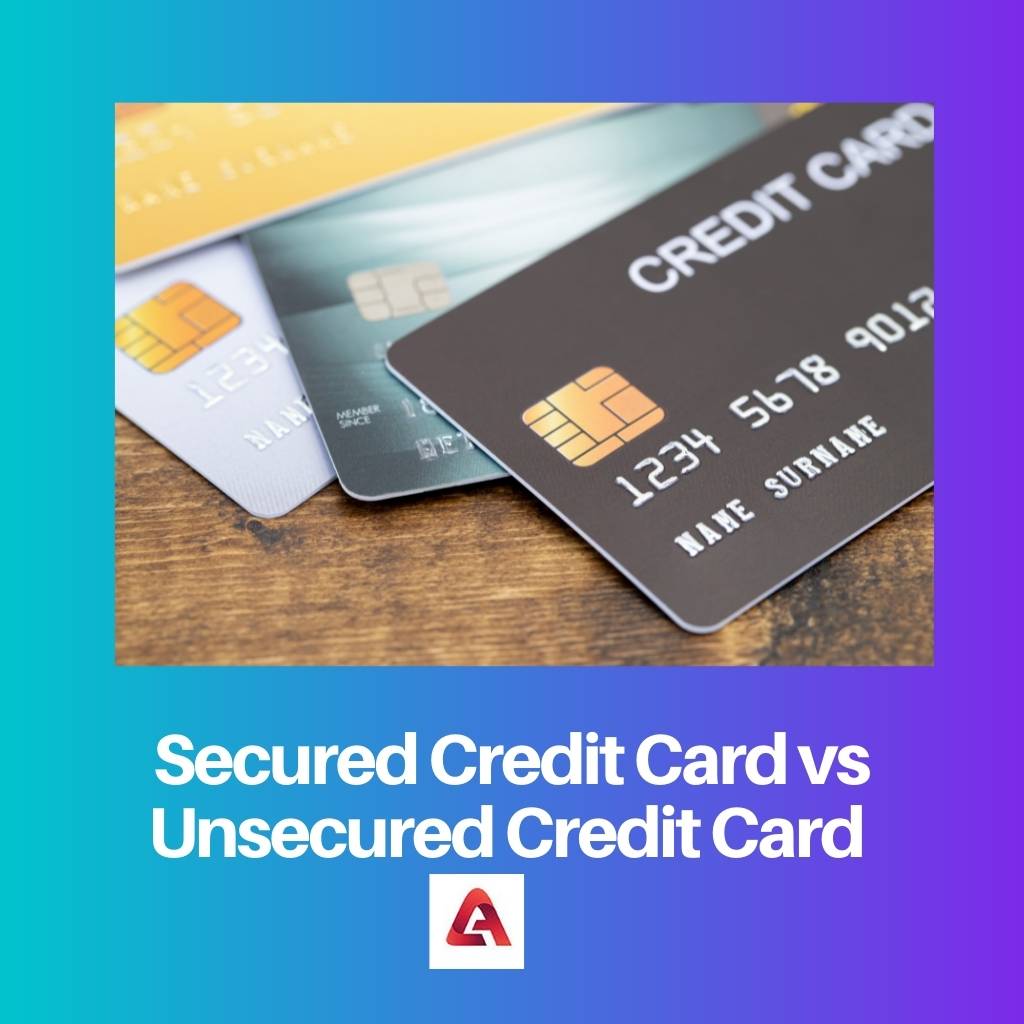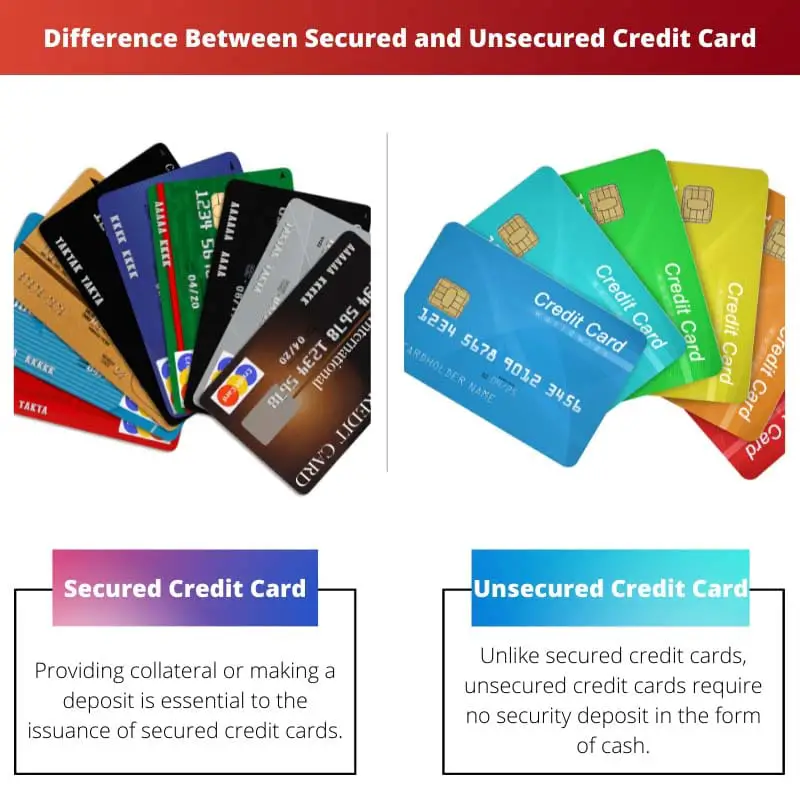There are two types of credit cards depending on a person’s credit score. These two credit cards are namely, Secured credit cards and Unsecured credit cards.
Though these are both types of credit cards and have some similar features, they differ from each other in many ways.
Key Takeaways
- Secured credit cards require a refundable security deposit, while unsecured credit cards do not.
- Secured credit cards help build or repair credit, while unsecured credit cards are for those with established credit history.
- Unsecured credit cards offer better rewards and benefits compared to secured credit cards.
Secured Credit Card vs Unsecured Credit Card
The difference between Secured and Unsecured credit cards is that they are based on different methods of issuance or qualifications. Providing collateral or making a deposit is essential to the issuance of secured credit cards. This deposit makes the credit card ‘secure.’ Typically, the cash deposit equals the card limit. On the other hand, a credit card that is unsecured does not require having a security deposit in cash or any other form of collateral. Depending on the individual’s income level and credit history, a credit limit is offered.

Providing collateral or making a deposit is essential to the issuance of secured credit cards. Secured Credit Cards can be advantageous when collateral is used.
The deposit or collateral makes the credit card ‘secure.’
The card limit is equal to the cash deposit. Secured Credit Cards are mainly intended for people who don’t have a strong credit history or credit score or are rejected for the use of credit cards because of their lack of income or lack of income proof.
The term unsecured credit card describes a credit card that does not require a security deposit or collateral. Card limits are determined by the person’s income and credit history; their credit score may also be considered.
Unsecured credit cards are promoted to people with a fair credit score who are having trouble being approved for a prime credit card account.
Comparison Table
| Parameters of Comparison | Secured Credit Card | Unsecured Credit Card |
|---|---|---|
| Deposit | Providing collateral or making a deposit is essential to the issuance of secured credit cards. Secured Credit Cards can be advantageous when collateral is used. | Unlike secured credit cards, unsecured credit cards require no security deposit in the form of cash. |
| Qualification | A person with a bad or no credit score can qualify for a Secured Credit Card with some security deposit or collateral. | A person with a good credit score, credit history, good income level can only qualify for an Unsecured Credit card. |
| Interest Rate | Low interest rates are associated with secured credit cards. | Credit cardholders with unsecured cards pay high interest rates. |
| Credit Limit | The credit limit offered is low or is based on the deposit. | The credit limit offered depends on the person’s creditworthiness. |
| Credit Check | Credit score might or might not be checked. | Unsecured credit cards cannot be issued without a credit check. |
| Promotion | Secured credit cards target and are marketed to people with no credit or a low credit score. | Unsecured credit cards are promoted to people with a strong credit score and income level who are being rejected for the use of a prime credit card account. |
What is Secured Credit Card?
Providing collateral or making a deposit is essential to the issuance of secured credit cards. Secured Credit Cards can be advantageous when collateral is used.
The deposit or collateral makes the credit card ‘secure.’
Cards are limited by the amount of cash deposited. Secured Credit Cards are mostly meant for people who do not have a solid credit history, don’t have a high credit score, or do not qualify for regular credit cards because they can’t verify their income.
The interest rate charged by Secured Credit Cards is low, and the credit limit offered is low or is based on the deposit. A credit check of a person in case of a Secured credit card may or may not be done.

What is Unsecured Credit Card?
The term unsecured credit card describes a credit card that does not require a security deposit or collateral. Card limits are determined by the person’s income and credit history; their credit score may also be considered.
Unsecured credit cards are promoted to people with a fair credit score who are having trouble being approved for a prime credit card account.
Unsecured credit cards charge high-interest rates, and the credit limit offered depends on a person’s creditworthiness. Unlike Secured credit cards, Unsecured credit cards cannot be issued by running a credit check.

Main Differences Between Secured and Unsecured Credit Card
- A person with a bad or no credit score can qualify for a Secured Credit Card with some security deposit in the form of cash or collateral, whereas a person with a good credit score, credit history, and good income level can only qualify for an Unsecured Credit card.
- Secured credit cards target and are marketed to people with no credit or a low credit score or are rejected for the use of credit cards because of their lack of income, lack of income proof, and bad or no credit score, whereas Unsecured credit cards are promoted to people with a fair credit score who are having trouble being approved of a prime credit card account.
- In the case of Secured credit cards, the credit limit offered is low or is based on the deposit, whereas, in the case of Unsecured credit cards, the credit limit offered depends on a person’s creditworthiness.
- A credit check of a person’s case of a Secured credit card may or may not be done, whereas Unsecured credit cards cannot be issued by running a credit check.
- Providing collateral or making a deposit is essential to the issuance of secured credit cards. Secured Credit Cards can be advantageous when collateral is used. The deposit or collateral makes the credit card ‘secure,’ whereas the term unsecured credit card describes a credit card that does not require a security deposit or collateral. Card limits are determined by the person’s income and credit history; their credit score may also be considered.

- https://www.aeaweb.org/articles?id=10.1257/jep.21.4.175
- https://papers.ssrn.com/sol3/papers.cfm?abstract_id=2862961